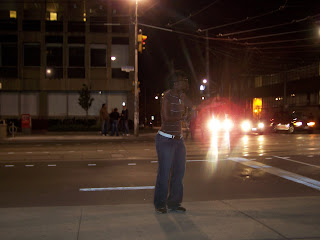
"I can't very well say goodbye to you in front of a fruit stand in Kensington Market, now can I?"
"No, I don't want to. But it does sound perfect, doesn't it?"
Well, I'm getting ahead of myself. Let's back up to friday night. My mom came up for the weekend, to see me off and make sure I was completely packed for Mexico. I had a little realization about halfway through my stay in Canada: I had wayyyyy too much stuff with me. A large suitcase was simply too large, and three smaller bags just weighted me down so much that whenever I wanted to go somewhere I had to find an empty place to keep my bags. So it was decided that I send home about 2/3 of my belongings. As soon as we packed it all up into a large box and mailed it, I felt a huge weight lifted from me. Literally. Now all I have is a small rolling suitcase and a backpack, and a duffel bag for my carry-on items. Glorious.
It was so wonderful to see my mom again, considering that was my last opportunity to see her until next february. I always love showing people around a city, even when it's not my city, and so I had a great time milling around with her, finally being able to overcome some self-consciousness and actually *enter* some stores that I had only previously admired from outside.
Saturday was the Toronto Poetry Slam, and my last open mic opportunity. I was joined in Toronto by Free Will and his accomplice Stephanie and we all went out to dinner at a vegan fusion restaurant with my mom. Will was convinced he would win the slam. Mid way through dinner, a group of people passed by our table, including one girl I vaguely recognized. I turned away thinking it was just one of those moments one has while traveling (those- hey you remind me of someone- moments) when I heard "um... Jessi?" It turns out that a girl I went to the hill school with was in Toronto for an environmental conference!!! I invited her to the slam later that night, hoping to have time to catch up.
My last Toronto Poetry Slam was incredible. The room was packed with people I'd never seen before, freckled with the familiar face of a poet on the slam team or enthusiast who frequented other toronto poetry events. A few of my non-poet friends even came out, including the girl from Hill. We sat cramped in the first row, cheering or booing judges, and loudly snapping (canadian poets show appreciation for works by snapping) for Free Will, who later, just as he predicted, won the slam.
The poets and I went out afterward, tinged with a bit of sadness on my part, seeing as though it would be my last opportunity for a post-slam gathering. At the end of the night, I got all the poets together for one last post-slam picture.

What dorks.
And that brings us to Sunday's pedestrian market readings. Spreading poetry to the masses as they mill about through fruit stands, vintage clothing stores, anarchist bookstores, with a backdrop of some of the best graffiti in Toronto.
And no, I didn't say goodbye to canadian poetry in front of a fruit stand. It was too soon to end the adventure there. I caved and got on a bus to Guelph with Free Will, where we explored a smaller, more soulful city. After milling about in Guelph, it truly was time to say goodbye. As i sat on the crowded bus, heading back into Toronto one last time, reality sank in a little deeper: I'm finally doing what I said I would be doing. And tomorrow, I'll be in Mexico.







